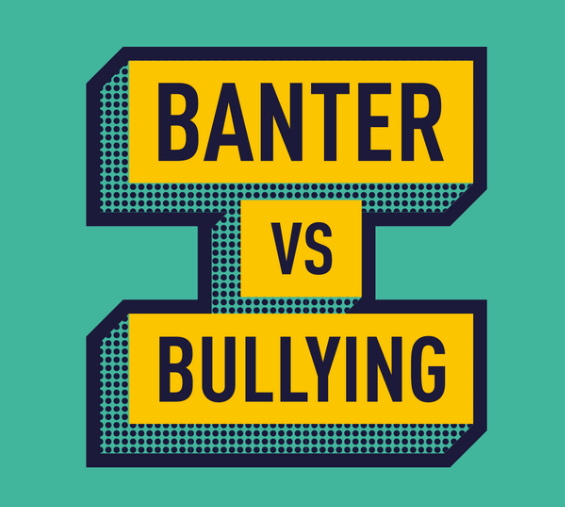Bullying - Key Stage 3 & 4

Anti-bullying week 2023: 5 ways we support schools to deal with bullying
A new post, “Anti-bullying week 2023: 5 ways we support schools to deal with bullying” has just been published on the The Education Hub blog. Bullying in school or college can have a devastating effect on children, young people and their families. We’re committed to helping schools tackle bullying, supporting them to create a calm environment where everyone feels safe. Here are 5 ways we’re helping schools to prevent bullying. 1. Relationships, sex and health education (RSHE) Our relationships, sex and health education (RSHE) guidance supports schools to build a curriculum that reflects diversity of views and backgrounds. It encourages respect for others and teaches young people about healthy relationships. RSHE includes teaching about bullying, positive friendships, and equality. For example, young people might learn about different …
Read the new post: https://educationhub.blog.gov.uk/2023/11/13/anti-bullying-week-2023-5-ways-we-support-schools-to-deal-with-bullying/
Friendship and bullying lesson packs
 The PSHE Association are proud to launch the KS1-2 and KS3-4 lesson packs, available exclusively to members, will help your pupils to make and maintain respectful friendships, manage any friendship challenges that arise, and identify and safely respond to bullying incidents - access the packs here.
The PSHE Association are proud to launch the KS1-2 and KS3-4 lesson packs, available exclusively to members, will help your pupils to make and maintain respectful friendships, manage any friendship challenges that arise, and identify and safely respond to bullying incidents - access the packs here.
Cyberbullying Guidance
 Childnet International have teamed up with a range of experts and young people to create this 'Cyberbullying: Understand, Prevent and Respond' guidance for schools. It covers:
Childnet International have teamed up with a range of experts and young people to create this 'Cyberbullying: Understand, Prevent and Respond' guidance for schools. It covers:
- What young people have said about cyberbullying
- Understanding cyberbullying
- Preventing cyberbullying
- Responding to cyberbullying
- Guidance on supporting school staff
Preventing Bullying
![]() The DfE Guidance for Preventing Bullying includes information on:
The DfE Guidance for Preventing Bullying includes information on:
- Preventing and tackling bullying
- Cyberbullying: advice for headteachers and school staff
- Advice for parents and carers on cyberbullying
Sexual Bullying
Advice on identifying and dealing with sexualised bullying: What is sexual bullying?
Stand Up to Bullying
Schoolsweek Report
A report by Schoolsweek has found that extreme internet users, those who use the internet for more than six hours per day, are more likely to be bullied. View the report here.
Support Services and Resource Providers
 ChildLine have a designated page for bullying issues that includes a video about building up your confidence after experiencing bullying. They also provide a webchat service.
ChildLine have a designated page for bullying issues that includes a video about building up your confidence after experiencing bullying. They also provide a webchat service.
 Ditch the Label is a global youth charity who help young people aged 12 to 25 navigate the issues affecting them the most; from mental health and bullying to identity, Asian hate crimes and relationships. They provide confidential support services, online forums, and educational resources for educators.
Ditch the Label is a global youth charity who help young people aged 12 to 25 navigate the issues affecting them the most; from mental health and bullying to identity, Asian hate crimes and relationships. They provide confidential support services, online forums, and educational resources for educators.
 Educational Action Challenging Homophobia (EACH) offers advice and helplines for young people up to the age of 18, and resources for educators. They specialise in support services in the areas of homophobic, biphobic and transphobic bullying or harassment.
Educational Action Challenging Homophobia (EACH) offers advice and helplines for young people up to the age of 18, and resources for educators. They specialise in support services in the areas of homophobic, biphobic and transphobic bullying or harassment.
Kidscape has advice and practical tips on dealing with bullying and cyberbullying and ways for young people to build their confidence.
![]() Young Minds offers online information and advice on bullying for children and young people. They also provide a text chat service.
Young Minds offers online information and advice on bullying for children and young people. They also provide a text chat service.
Tootoot - Pupil Voice and Safeguarding App
Tootoot is a pupil voice and safeguarding app which combines all aspects of safeguarding into a simple and effective app. It's features include:
-
Enabling pupils to confidentially report incidents
-
Paperless incident reording for staff
-
Real time reports for SLT and Governors
-
Mental Healtha nd wellbeing tracking for pupils and staff
-
Detailed student chronologies
-
Monitoring of vulnerable student groups
YoungMinds Cyberbullying Inquiry
Alex Chalk, MP for Cheltenham, in partnership with YoungMinds and The Children’s Society, has set up an inquiry into the impact of social media bullying on children and young people’s mental health.
Choose Respect: Anti-Bullying Week 2024
Article by Aoife Nic Colaim on "Headteacher Update" It is entirely possible to disagree with someone while still respecting them and this is a vital lesson to instil in our students. Aoife Nic Colaim looks ahead to Anti-Bullying Week 2024
Anti-Bullying Week 2024 – which takes place from November 11 to 15 – brings a powerful theme to the fore: Choose Respect.
This year, the Anti-Bullying Alliance, in collaboration with young people, aims to empower everyone to respect others, even during disagreements.
From playgrounds to Parliament, homes to our phones, the Choose Respect campaign addresses head-on the bullying that affects millions of young people.
By encouraging children and young people to avoid bullying, even when they disagree, and urging adults to set positive examples both online and offline, we can envision a world where respect and kindness flourish.
Helping young people navigate life’s challenges is not easy and bullying can seem like another minefield that school staff are expected to be experts in, often with minimal training.
Bullying is a multifaceted issue, ranging from simple fall-outs between friends that have spiralled out of control, to more serious prejudice-based bullying.
The Anti-Bullying Alliance seeks to support you in supporting your pupils through these challenges and we have developed numerous resources and CPD training sessions.
One notable initiative is the collaboration between the Anti-Bullying Alliance and Nottingham Trent University to create a new school toolkit and CPD online training course entitled Banter or bullying: Navigating the line of acceptability.
This interactive training course will help schools to adopt a comprehensive anti-bullying approach. It focuses on preventing the misuse of banter, identifying bullying behaviours disguised as banter, and equipping children and young people with the skills to distinguish between acceptable banter and intentional unkind behaviour.
It is a topic Anti-Bullying Alliance director Martha Evans wrote about in Headteacher Update recently, offering eight signs for school staff to look out for when deciding if something is “banter or bullying”.
It is important that we take the opportunity during Anti-Bullying Week 2024 to think about how we can promote a respectful culture for children and young people, and this is particularly important in a school environment.
A message we encourage you to promote within your school is “we may not be best friends with everyone, but we must choose respect” – emphasising that it is entirely possible to disagree with someone while still respecting them.
Below are some helpful tips for teaching children and young people how to engage respectfully and constructively in conversations, especially when there are disagreements:
- Try to understand and listen: Listen to what the other person is saying without interrupting, even if you don’t agree with them. Letting people speak and trying to understand their viewpoint makes people feel respected.
- Keep an open mind: Remember that not everyone is the same or thinks the same and we are all entitled to our own opinion.
- Don’t get personal: Address the issue at hand without making it about the person.
- Choose respect: Disagreeing with someone is never an excuse for bullying. We don't have to agree with someone to treat them with respect. Use a non-accusatory and respectful language and tone.
- Know when to agree to disagree: Understand that it is okay to have differing opinions, and that disagreement does not mean we cannot get along.
- Think positively: Focus on the good in the situation – such as the things you agree on.
By encouraging pupils to practise these strategies, we can create a respectful environment where differing opinions are seen as opportunities for growth and learning, rather than as sources of conflict.
This Anti-Bullying Week let’s all commit to “choose respect”. Encourage your students to embody respect in their daily interactions, and as educators, lead by example. Adults play a crucial role in setting positive examples and modelling respectful behaviour for young people. With the right tools and mindset, we can transform our schools into environments where respect and kindness prevail, and students feel safe, valued, and respected.
Join us in making this vision a reality. What will you choose?
- Aoife Nic Colaim is programme manager at the Anti-Bullying Alliance, the organisers of Anti-Bullying Week.
Further information & resources
- Anti-Bullying Week takes place from Monday, November 11 to Friday, November 15, 2024. To find out about how your school can take part and to access free resources, visit https://anti-bullyingalliance.org.uk/
Banter VS Bullying Lesson Plan & Presentation

'Anti-bullying from The Diana Award' have put together the following Lesson Plan and Presentation which covers definitions of bullying behaviour and banter and will help young people to explore the difference between the two. Designed to be delivered by young people for young people it is recommned to be used by and for students aged 11 and above.
To view the Lesson Plan and resources click here
To view the presentation click here
Anti-bullying resources for schools and parents
The Anti-bullying Alliance have publishhed a Toolkit for Parents and Carers, on how to support their children who are experiencing bullying as well as how to engage constructively with their child's school. The toolkit includes understanding their children's rights, action they can take if bullying is happening as well as outlining what is and isn't bullying and how they may identify if a child is being bullied and advise on how to respond if their child is bullying others.
General information and support for Schools
FREE CPD Anti-bullying online training
Tagged under: bullying, sexual bullying, cyber bullying, hate crime, Key Stage 3, Key Stage 4, Burger King, Key Stage 2, name calling, intimidation, YoungMinds, The Children's Society, social media, mental health, banter, lesson plan,
Was the information on this page helpful? 


